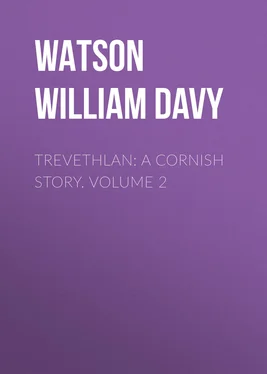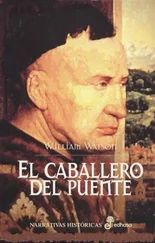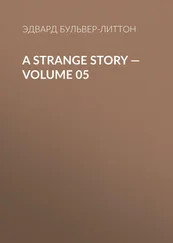William Watson - Trevethlan - A Cornish Story. Volume 2
Здесь есть возможность читать онлайн «William Watson - Trevethlan - A Cornish Story. Volume 2» — ознакомительный отрывок электронной книги совершенно бесплатно, а после прочтения отрывка купить полную версию. В некоторых случаях можно слушать аудио, скачать через торрент в формате fb2 и присутствует краткое содержание. Жанр: foreign_prose, foreign_antique, на английском языке. Описание произведения, (предисловие) а так же отзывы посетителей доступны на портале библиотеки ЛибКат.
- Название:Trevethlan: A Cornish Story. Volume 2
- Автор:
- Жанр:
- Год:неизвестен
- ISBN:нет данных
- Рейтинг книги:3 / 5. Голосов: 1
-
Избранное:Добавить в избранное
- Отзывы:
-
Ваша оценка:
- 60
- 1
- 2
- 3
- 4
- 5
Trevethlan: A Cornish Story. Volume 2: краткое содержание, описание и аннотация
Предлагаем к чтению аннотацию, описание, краткое содержание или предисловие (зависит от того, что написал сам автор книги «Trevethlan: A Cornish Story. Volume 2»). Если вы не нашли необходимую информацию о книге — напишите в комментариях, мы постараемся отыскать её.
Trevethlan: A Cornish Story. Volume 2 — читать онлайн ознакомительный отрывок
Ниже представлен текст книги, разбитый по страницам. Система сохранения места последней прочитанной страницы, позволяет с удобством читать онлайн бесплатно книгу «Trevethlan: A Cornish Story. Volume 2», без необходимости каждый раз заново искать на чём Вы остановились. Поставьте закладку, и сможете в любой момент перейти на страницу, на которой закончили чтение.
Интервал:
Закладка:
William Davy Watson
Trevethlan: A Cornish Story. Volume 2 (of 3)
CHAPTER I
Pur' è soave cosa, a chi del tutto
Non è privo di senso, il patrio nido:
Che diè Natura al nascimento umano,
Verso il caro paese, ov' altri è nato,
Un non so che di non inteso affetto,
Che sempre vive, è non invecchia mai.
Once more we stand on the shore of Mount's Bay. Far behind we have left the whirl and tumult of the metropolis, and we hear only the hoarse roar of the surges, driven by the last winds of January to beat against the granite at our feet. When last we looked over the same waters, the yellow leaves were falling from the trees, and the little waves rippled musically upon the rock, while the voice of mourning was heard in our halls. Yet if the year was declining, there was beauty in the decay; if the season was sad, there was hope amidst the sorrow. We return to find the fields desolate, and the sea tempestuous, and our house still forlorn. The face of nature is gloomy and cold, and hope has vanished from our fireside.
Such might be among the first reflections of the orphans of Trevethlan, as they gazed from the windows of the castle over the well-known landscape. They had come home, not as children from school to holiday, exulting in freedom and buoyant with hope, to exchange coercion for caresses; nor as older pupils, having learnt the value of time, merely to modify the routine of occupation, and gladden parental affection with their progress and prudence; nor yet as those who, having entered on the labour of life, know that the bow must not always be bent, and rejoice to seek relaxation around the hearth where they were nursed. Far deeper than any of these were the emotions of the sister, and dark and stern were the thoughts of the brother.
Helen's letter had fallen upon Polydore like a thunderbolt. She had, indeed, in previous communications somewhat ruffled his serenity by indistinct references to the new solicitude she detected in Randolph; but the worthy chaplain readily explained all similar hints by the novelty of his old pupil's situation. "He will become used to it before long, Mr. Griffith," Polydore would say, when the steward ventured to remind him of their difference of opinion respecting the orphans' scheme. "'Tis only the roughness of a first meeting with the world. The points will be soon rubbed smooth. There's a great difference between the Temple and Trevethlan Castle." In reply to which sort of remark, Griffith could only shrug his shoulders, and hope it might all turn out well in the end.
So when the missive arrived, in which Helen announced that her brother had proclaimed their real name, and abandoned his career, and that they should follow the letter without delay, Polydore was struck with sudden consternation. The steward was too delicate to show that he felt no similar surprise in the chaplain's presence, but to his wife he avowed that he was not in the least astonished. "A Trevethlan conceal his name!" he exclaimed. "It's not in the blood. No, Charlotte Griffith; if we are poor, we are also proud. The secret would be always on the tip of his tongue. Why, suppose he quarrelled? Not unlikely, I can tell you, in one of our house. D'ye think, Mrs. Griffith, Randolph Trevethlan would go out as Mr. Morton? Pooh! pooh!"
Mrs. Griffith rather shuddered at the idea, but she remembered sundry anecdotes of the picture gallery which forbade her to impeach the justice of her husband's position. Whatever were the cause of the return, she rejoiced at the effect, and spread the same feeling among all the little household, by her orders to prepare for the reception of her young master and mistress.
So they came. It was early in the afternoon when their chaise rattled round the green of the hamlet; but a cold sleet drove along upon the wind, and kept the villagers within doors. The folk hurried to their windows only in time to see that the carriage had passed, but the extreme rarity of such a visitation drew forth a few of the curious to gaze after the chaise, as it wound more slowly up the ascent of the base-court. Randolph lay back in his corner, gloomy and foreboding; but Helen leant forward to catch the first glimpse of an old familiar face. And Jeffrey was duly on the watch; he caught sight of the carriage as it began the ascent; he soon recognized his young lady's face at the window; the gates flew open under his hand; before the travellers had alighted at the hall-door, he had run the old flag to the top of its staff, and a faint cheer from the hamlet greeted the appearance of the well-known signal. The orphans were at home.
Anxieties and forebodings vanished for a season in the warmth of welcome. The time for questions and explanations was not arrived. Everything seemed in exactly the same order as when the brother and sister left; and were it not for the difference of the seasons—were it not that a fire crackled cheerfully in the great chimney, and that patches of snow lay on the bed of mignionette, they might have supposed a night only had elapsed since their departure. But the change in themselves told that the interval had been fraught with momentous consequences for each of them.
When the first hurry of congratulation was over, Helen retired for some confidential talk with Mrs. Griffith, and her brother accompanied the chaplain in a walk round the castle. Yes, every thing remained exactly as it was. In the library, even the volume which Randolph was reading with his instructor, "Cicero on the Art of Divination," remained on the table, as if closed but yesterday, and the subject brought a passing cloud upon his brow. The portraits in the picture-gallery showed the recent care of Mrs. Griffith.
"My mother's likeness is not here, Mr. Riches?" Randolph said abruptly, as they passed along.
The chaplain, greatly surprised, shook his head in silence.
They ascended to the battlements, and faced the inclemency of the weather. The ancient pieces of ordnance showed signs of that diligence on the part of old Jeffrey, to which Polydore had alluded in a recent letter to Hampstead. More dangerous they, perchance, to the defender than the foe.
"Is there really so much alarm in the country, my dear sir?" Randolph asked. "Are our good Jeffrey's perilous precautions in any way warranted?"
" It fama per urbes —you know the rest," the chaplain answered. "We will speak of it by and by."
They descended to the court-yard. If the castle was unchanged, its scanty retainers were as little altered. At the great gateway Randolph found Jeffrey pacing up and down under the arch in demi-military style, while an old-fashioned brass blunderbuss rested against the wall.
"God bless you! Master Randolph," said the old man, taking the offered hand between both of his; "and welcome back. And thanks be to Him, that if so be these walls must fall to the riff-raff from Castle Dinas, why, fall they will around a Trevethlan. But the day shall not come, while"—he caught up his piece, and suddenly discharged it in the air—"the evening gun, Master Randolph. A little too soon, and not like that as was fired in the old time. But it just serves maybe to frighten the rascals, and let 'em know old Jeffrey is awake."
Randolph thanked the trusty warder for his zeal, and expressed a hope that his forebodings might not be realized; but the sentry shook his head dolefully, and reloaded his gun, saying, "Ye might as well just keep your pistols handy, Master Randolph."
Already, even in this short perambulation, the chaplain was greatly struck by the change which he observed in his former pupil. The stripling, meditative and gentle, had become a man, haughty and impassioned. The disposition, of old plastic as wax, was now at once obstinate and capricious. The change was marked in the imperiousness of Randolph's bearing, in the curl of his lip, and the abruptness of his speech. There was no want of his former respect or affection; but it was plain that henceforth he acted on his own impulse, and was not to be swayed by those who might surround him. "Is it for good or for evil?" the chaplain asked himself, when Randolph parted from him to descend to the beach, and intimated that he wished to be alone. "Pray Heaven for good, or surely my life has been wasted."
Читать дальшеИнтервал:
Закладка:
Похожие книги на «Trevethlan: A Cornish Story. Volume 2»
Представляем Вашему вниманию похожие книги на «Trevethlan: A Cornish Story. Volume 2» списком для выбора. Мы отобрали схожую по названию и смыслу литературу в надежде предоставить читателям больше вариантов отыскать новые, интересные, ещё непрочитанные произведения.
Обсуждение, отзывы о книге «Trevethlan: A Cornish Story. Volume 2» и просто собственные мнения читателей. Оставьте ваши комментарии, напишите, что Вы думаете о произведении, его смысле или главных героях. Укажите что конкретно понравилось, а что нет, и почему Вы так считаете.












